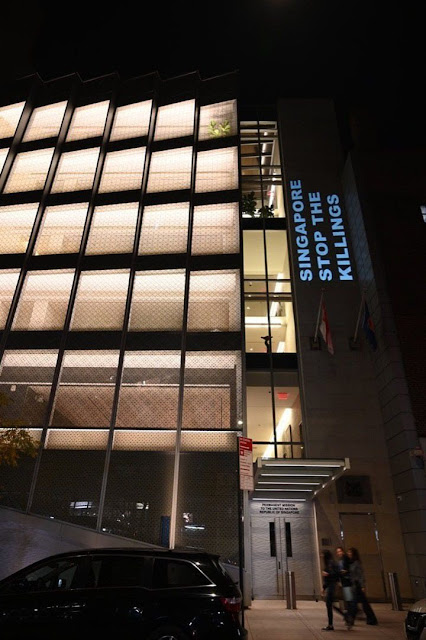STOP THE KILLINGS
Weekly column written for the Singapore Unbound newsletter. Sign up here.
housing Singapore’s Permanent Mission to the United Nations on November 2, 2022.
The NYC-based Singaporean organizer explained, “The goal is to name and shame on the international arena,
to increase awareness outside of Singapore and show our support for those in Singapore fighting for justice."
The shooting at Club Q in Colorado Springs last Saturday, killing five people and wounding 17 others, was a tragedy. The repercussions of the shooting will live on, not only for the wounded and the families of the dead, but also for the LGBTQ community everywhere, who are reminded, once again, that they are not safe even in what is supposed to be a "safe space."
Tragic in a different manner is the Singapore state's judicial murder of prisoners on death row. State-sanctioned execution and a mass shooting appear to be vastly disparate, and yet we should not allow the different particulars to obscure some underlying similarities.
(1) The results of both phenomena are fatal for victims and traumatic for survivors.
Because of the shooting, we have lost Derrick Rump, 38, who "had a heart of gold," his mother said; Daniel Aston, 28, who loved '80s music and hats; Kelly Loving, 40, a trans woman who was like a mother to other trans people; Raymond Green Vance, 22, who was saving up money from his FedEx job to get his own apartment; and Ashley Green Paugh, 35, who worked for a non-profit that helps find loving homes for foster children. Ashley's own daughter is 11 years old. Her husband said, “We can’t even begin to understand what it will mean to not have her in our lives." You can read more about the victims here.
Because of state-sanctioned murder in Singapore, we have lost 11 people in 2022 so far, including Abdul Rahim bin Shapiee, 45, whose family was informed of the date of his execution only a week before the event; Nazeri bin Lajim, 64, one of 10 children raised by a mother who washed clothes for a living; Norasharee bin Gous, 49, whose conviction was almost solely based on the testimony of his co-accused; Kalwant Singh, 31, who looked after his sister's baby when she had to go to Kuala Lumpur to work; Nagaenthran K Dharmalingam, 33, who had an IQ of 69. You can read more about the victims here.
Some readers will be outraged by the implicit equation of shooting victims to executed criminals, but such a reaction misunderstands the razor-thin line between victims and perpetrators. Given different genetic inheritances and social circumstances, we could easily change places with one another. The point here is not to excuse wrongdoing; rather, it is to underline the impassable boundary between life and death. The dead cannot be hurt, forgiven, nor reformed. They are more like one another than like anyone living.
(2) The causes of both phenomena are the same, systemic bias.
The alleged Club Q shooter Anderson Lee Aldrich, 22, will face multiple murder and hate crime charges. Details are emerging about his troubled past. At 15, he was viciously bullied online, and, according to The Washington Post, "a YouTube account was created under his name, featuring a crude, profanity-laden animation under the title, 'Asian homosexual gets molested.'" (Aldrich's attorney told the press yesterday that his client identifies as non-binary.) In the video title, homophobia was conflated with racism.
Where do children get these awful ideas from? From their parents, teachers, and preachers, in other words, from family, school, and organized religion, those influential institutions. Aldrich was brought up within the Mormon Church, which still teaches that being gay is wrong. As reported in Newsweek, in 2021 the president of Brigham Young University called on Mormons to deploy a "little more musket fire" against those who seek to degrade the institution of marriage within the church. He is not alone, of course, and neither is the Mormon Church, in reinforcing the wider anti-LGBTQ culture. Instead of holding just the shooter responsible for the deaths in Colorado Springs, we should hold responsible all the cultural influencers who have worked against equality and inclusion.
Systemic bias is perhaps not as obvious in Singapore's death penalty, for, after all, the law is supposed to be impartial. However, a mere glance at the names of the victims of state murder above reveals a troubling pattern. The victims all came from racialized minority groups. On even a cursory reading, their lives are clearly biographies of severe economic disadvantage. The law may be equitable in intent, but not in its effects.
By itself, such a pattern of bias should immediately call for a public commission of inquiry into the death penalty. It is at least possible that the pattern of bias is caused by wider social, racial, and economic inequities. Instead of a commission of inquiry, Singapore courts have made it even harder for death-row inmates to find justice by imposing punitive costs on lawyers who represent them. Noting these problems, the International Commission of Jurists has called on Singapore to "halt executions and cease punitive cost orders against death-row lawyers."
These are not easy matters to read and think about, especially on Thanksgiving Day, here in the US. Still, to see underlying similarities between apparently disparate phenomena is a step towards finding a systemic solution and not a reactive one. The step may simply be an articulation of the values we uphold—to cherish human life, to fight human bias—for on such understandings are coalitions forged and actions launched, to stop the killings.
Jee Leong Koh
November 24, 2022


Comments